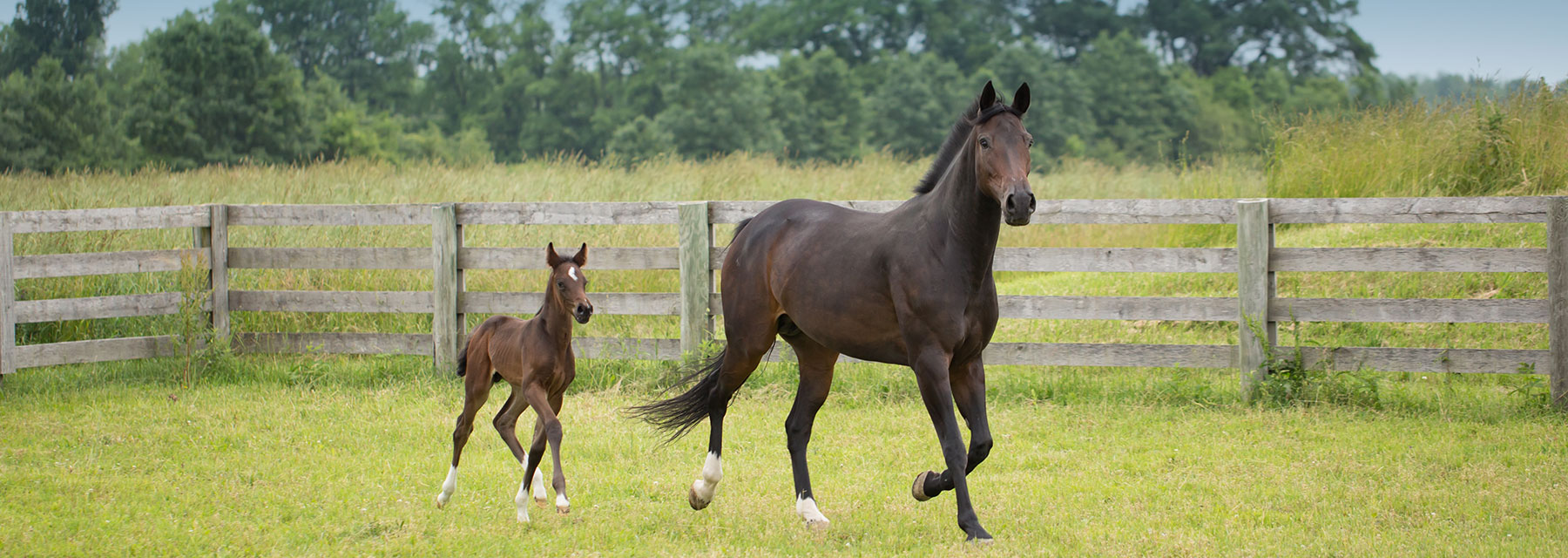Healthy Foals Come From Healthy Mares;
Nutrition’s Importance During Pregnancy
Every mare owner knows there are many plans to be made when thinking about breeding season. What sire to breed the mare to? What form of breeding to use? But one thing mare owners should not overlook is nutrition. The mare has a gestation period of roughly 11 months and 11 days, but foals can be born anywhere from 320 to 365 days of gestation. Before breeding, during gestation, and after foaling, the nutrition of the mare is essential not only for her but to help ensure the development and growth of a healthy foal.
The Before Story
To ensure your mare is ready for breeding season, it is essential to talk with your veterinarian. Your vet may perform a reproductive ultrasound and look over your mare’s feet, teeth and overall soundness to ensure she is ready to carry a foal. The nutritional status of the mare is also extremely important. Mares with a body condition score (BCS) of less than 5 often have difficulty with breeding because the mare’s system realizes that it may not be able to support a growing fetus.
The Power of Nutrition
Once your mare conceives, fetal development begins right away. As early as 14 to 16 days gestation, the cells divide to begin forming a fetus. At 21-28 days, the day equine breeders usually get very excited, your vet will be able to ultrasound your mare and see the little flicker on the ultrasound that’s indicative of a heartbeat! At 40 days, the umbilical cord takes over providing nutrition to the foal from the mare, and structures such as hooves, begin to develop. Mares who are well nourished when they conceive will be able to provide the developing foal with the nutrients that are essential for early fetal development. Except for an increase in vitamin A and vitamin E requirements, pregnant mares can be fed to meet their maintenance nutrient requirements through the first 4 months of gestation.
Once the mare reaches the fifth month of gestation, her energy, protein, vitamin and mineral requirements increase. Proper nutrition to support the developing foal is essential during the remainder of pregnancy. The mare’s energy needs increase by 0.5-1 Mcal digestible energy (DE) from month 5 through month 11 of gestation. The mare’s increased dietary energy and protein requirements should be met by feeding a highly digestible forage. A balanced vitamin and mineral supplement can provide important nutrients including calcium, phosphorus, magnesium, copper and zinc to support bone and soft tissue development. Adding 1,200–2,000 IU of natural vitamin E to the ration of a mare during the last trimester of her pregnancy can help to increase the concentration of immunoglobulins in the colostum. This “liquid gold” enhanced with higher levels of IgG and IgA can help to promote even stronger immunity in the newborn foal.
No Sweat In Foaling
After your mare delivers a healthy foal, your mare’s nutritional requirements greatly increase as she begins lactating to provide the nutrients required to support her growing foal. A mare can produce up to 2-3% of her body weight in milk per day. During lactation, adequate dietary energy, protein, calcium, phosphorus, as well as a variety of other minerals and vitamins are essential for the development of healthy bones, tendons, and all organ systems. If these nutrients are not properly provided in the mare’s diet, her body will begin depleting its own nutrient stores to care for her foal.
Eliminating the Guesswork
Proper nutrition complete with vitamins, minerals and essential fatty acids are now and will forever be an important part of your foal’s proper development and good health. When you supplement your mare’s ration with Platinum Performance® Equine your foal will also benefit from the vitamins, minerals, antioxidants and omega-3 fatty acids included in every scoop.

by Elizabeth Hay,
Platinum Performance®
Tell Us About Your Horses! Share Your Platinum Story.
